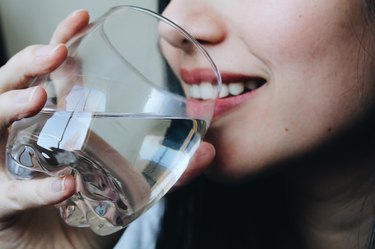
If you've noticed some weight gain in your face and are looking for a quick-fix, there are certain lifestyle changes you can make to help reduce bloating and make your face seem leaner. For a more permanent solution, you will need to lose weight all over if you want to lose weight on your face since spot reduction is not possible.
Read More: The Best Way to Lose Weight in One Month
Video of the Day
Video of the Day
Tip
The best way to quickly lose weight on your face is to get rid of water weight, by preventing water retention and bloating.
Cut Out Excess Salt
According to the American Heart Association (AHA), a high-sodium diet causes water retention. The excess sodium draws water into your bloodstream, which increases the total volume of blood in your blood vessels. Retaining this excess water leads to bloating and weight gain. The AHA recommends limiting your sodium intake to 1,500 milligrams a day with an upper limit of 2,300 milligrams a day for most adults.
Read More: 10 Myths About Salt Debunked
The AHA lists pizza, fast food burgers and sandwiches, bread, cold cuts and cured meats, canned soup, burritos and tacos as the top culprits when it comes to excess sodium. If you regularly eat these foods, you may want to swap them out for more nutritious meals. The USDA's 2015-2020 Dietary Guidelines for Americans recommend that people add more fruits and vegetables to their diet, opt for whole grains and consume healthy protein from seafood, lean meats, eggs, legumes, nuts, seeds and soy products. Making the switch to a healthier, lower-sodium diet can help you reduce the water weight in your face.
Get Enough of These Minerals
Calcium, magnesium and potassium are minerals that help reduce water retention. A January 2017 clinical trial of 66 women with premenstrual syndrome, published in Obstetrics & Gynecology Science, found that calcium reduced fluid retention and bloating. The National Institutes of Health (NIH) recommend an intake of at least 1,000 milligrams of calcium per day for most adults. They list dairy products, calcium-fortified cereals and juices, soy milk, tofu, sardines, salmon and vegetables like Chinese cabbage, kale and broccoli as the top sources of calcium.
The Mayo Clinic suggests magnesium supplements as a way to combat water retention. The NIH lists legumes, nuts, seeds, whole grains, green leafy vegetables like spinach, fortified breakfast cereals and other fortified foods, milk and yogurt as good sources of magnesium. They recommend a daily intake of 400 to 420 milligrams for men and 300 to 320 milligrams for women. Like calcium, magnesium can be supplemented if you're not getting enough from your diet.
Potassium is another key mineral when it comes to avoiding water retention because it helps keep your sodium levels in check, according to the NIH. They list apricots, prunes, raisins, squash, bananas, potatoes, poultry, meat, fish, soy products, lentils, milk, yogurt and nuts among the top sources of potassium.
Stick to Water
Alcohol, caffeine, soda and sugary drinks are all diuretics, which means they cause your body to retain water. Even sugar-free drinks with artificial sweeteners like fructose and sorbitol can cause bloating. A June 2018 study published in Chemistry Research Journal found that carbonated water releases carbon dioxide into your intestinal tract, causing gas and bloating. Water keeps you hydrated and — contrary as it sounds — can prevent water retention, so it's your best bet. If plain water gets too boring, you can add flavor in the form of lemon and cucumber slices, or fresh mint leaves.
- American Heart Association: “Get the Scoop on Sodium and Salt”
- American Heart Association: “How Much Sodium Should I Eat Per Day?”
- American Heart Association: “The Salty Six”
- USDA: “2015-2020 Dietary Guidelines for Americans”
- US Library of Medicine: “Effect of Calcium on Premenstrual Syndrome: A Double-Blind Randomized Clinical Trial”
- National Institutes of Health: “Calcium”
- Mayo Clinic: “Water Retention: Relieve This Premenstrual Symptom”
- National Institutes of Health: “Magnesium”
- National Institutes of Health: “Potassium”
- FamilyDoctor.org: “Bloating”
- Chemistry Research Journal: “Monitoring Bottled Mineral Water Brands”
- Victoria State Government: “Fluid Retention (Oedema)”